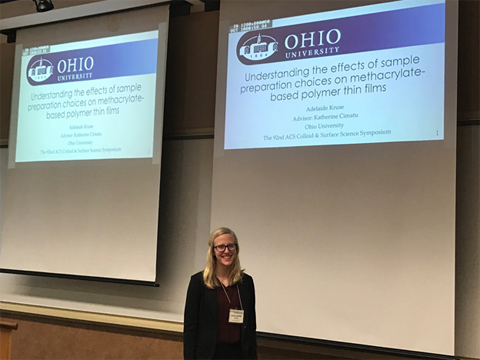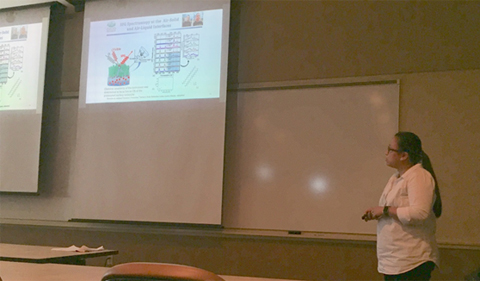Adelaide “Addy” Kruse ’19, an Honors Tutorial College undergraduate student, and Dr. Katherine Cimatu, Assistant Professor of Chemistry & Biochemistry at Ohio University, presented at the 92nd ACS Colloids and Surface Science Symposium at Penn State University in June.
Kruse gave a very impressive talk on her recent work about functionalized methacrylate-based polymer surfaces. She discussed how the physicochemical properties of the polymer thin films and their preparation are affected by varying the substrate, solvent, and drying time. She confirmed her results using atomic force microscopy, goniometry, and sum frequency generation spectroscopy for morphology and adhesion, contact angle, and spectroscopic measurements, respectively.
The goal of this project is to develop a deep understanding of these novel thin films in order to explore potential applications in anti-fouling and corrosion preventing coatings in the future.
Kruse would like to thank the Honors Tutorial College for funding her trip to this conference and the Chemistry & Biochemistry Department for supporting her summer research through the Couch Internship.
- See “Notable Alumni | Chemistry Alum Heads Global Regulatory Unit at Celgene Corp.” Richard Couch is Vice President of Global Regulatory CMC (Chemistry, Manufacturing and Controls), responsible for a department of approximately 25 scientists covering small molecules, biologics, and cell therapies at Celgene Corp., a global biopharmaceutical corporation. He a B.S. degree in Chemistry in 1984 from the College of Arts & Sciences at OHIO.
Also, Cimatu presented the overall research focus of her group, specifically on monomers and polymers at air-liquid and solid-liquid interfaces, adsorption of surfactants at the air-liquid interface, and surface-initiated reactions for magnetic nanoparticles.
Abstract for Understanding the effects of sample preparation choices on methacrylate-based polymer thin films
- Kruse, N. Adhikari, U. Premadasa, K. A. Cimatu. Chemistry and Biochemistry, Ohio University, Athens, OH. Email: ak694414@ohio.edu
Polymer thin films (PTFs) are an integral part of technology, including in electronics, biomedical devices, and the oil and gas industry. Solvent choice, heating time, and substrate choice all affect the characteristics of the PTF surface, and understanding these effects will lead to better and more efficient manufacturing of PTFs in the future. This work uses functionalized methacrylate-based PTFs as a model system because of its ease of synthesis and variety of function group options. By comparing the samples using sum frequency generation (SFG) spectroscopy, atomic force microscopy, and goniometry, the effects of the sample preparation procedure are analyzed. The current data suggests that the substrate choice affects the PTFs the most, leading to significantly different morphologies and adhesion values. For example, while samples on quartz surfaces are relatively flat and smooth, samples on glass surfaces exhibit holes up to 10 micrometers in diameter. In preliminary SFG data, the -OCH3 symmetric stretch, -CH3 symmetric stretch, and the -CH3 Fermi resonance peaks are all visible in the SSP polarization, as well as the C=O peak, and will be continued to be used to establish the molecular conformation at the air-polymer interface as it changes with solvent and heating time. Furthermore, the data suggests that solvent choice more so affects the morphology whereas heating time more so affects the adhesion values. This study shows how the choices made in solvent, heating time, and substrate all affect the characteristics and quality of polymer thin films, and can be carefully manipulated to achieve the desired type of thin film.





















Comments